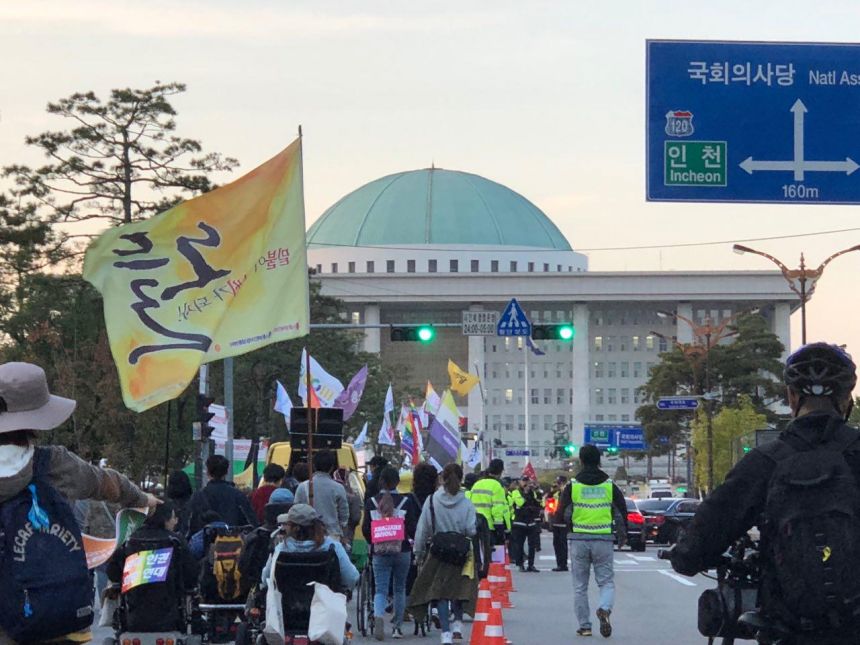
*Photo: Members of Nodeul School, one of the popular schools for adults with disabilities in South Korea, are marching toward the National Assembly of South Korea in a disability rights demonstration. ⓒNodeul School
KDF and NCPSD(National Council of Popular School for People with Disabilities) of South Korea submitted a written statement on the right to education of adults with disabilities during COVID-19 Pandemic.
Statement_COVID-19 and the Right to Education of Adults with Disabilities
Korean Disability Forum is an umbrella organisation consists of 18 DPOs in the Republic of Korea. Including the National Council of Popular School for People with Disabilities, the member organisations of KDF take seriously the violation of educational rights of adults with disabilities during the Covid-19 Pandemic. To build back better our society, we hope that the issue of education rights for adults with disabilities will be considered seriously throughout the 14th CoSP.
In South Korea, only 16.6% of persons with disabilities get a college education while 72.5% of the whole population does. In addition, universities and colleges do not provide enough educational support to disabled students; universities provide study support persons (for writing or typing, transportation, and daily supports) and assistive devices. However, even these limited supports were stopped as the schools started to provide online classes. Despite the laws enshrine that disabled college students should be provided with reasonable accommodation, it depends on the will of the schools, college students with disabilities were not fully protected their rights to education.
Due to the limited accessibility to education, the rate of persons with disabilities who could not receive proper education in their learning age is very high. 54.4% of the disabled people could not graduate from middle schools, while only 12% of the whole population couldn't. Furthermore, economically indicative population. In addition, 62.7% of the registered disabled aged 15 or older accounted for the economically inactive population, 1.7 times higher than 36% of the total population.
In the Republic of Korea, life-long education centres (so-called ‘popular school(Yahak in Korean)’) for persons with disabilities provide individualised education and supports for independent living in the community to the persons with disabilities who couldn’t participate in the official education courses in their learning age or who lived in institutions. However, during the COVID-19 Pandemic, support measures for the life-long education centres and the adult learners with disabilities were severely insufficient, as the response of the Ministry of Education focused only on school-age education. Thus, the centres couldn’t help shutting down the daily courses. After a while, centres opened virtual courses for the long-neglected adult learners with disabilities, but due to the lack of clear guidelines or supporting measures, confusion lasted in the field. It results in the exclusion and isolation of adult learners with disabilities, whose daily lives are mostly based on the education centres in the community.
Highlighting the obstacles that the adults with disabilities faced during the Pandemic, the member DPOs of KDF, including NCPSD, urge states parties to the UN CRPD as below;
1. Students with disabilities are everywhere. Guarantee educational accessibility for the adult learners with disabilities, the rights engraved in the UN CRPD 9(Accessibility) and 24(Education)
2. Education is a critical key for full participation in the community. Guarantee safe and pauseless education based on the UN CRPD 10(Right to life), 11(Risk and humanitarian emergencies), and 10(Independent living and inclusion in the community), so that the participation of the persons with disabilities to the community are not hindered during emergencies.

 Statement for AP regional online consultation for UN CRPD Dei...
Statement for AP regional online consultation for UN CRPD Dei...
 Side Event for ESCAP NEA multistakeholer Forum on SDGs "...
Side Event for ESCAP NEA multistakeholer Forum on SDGs "...